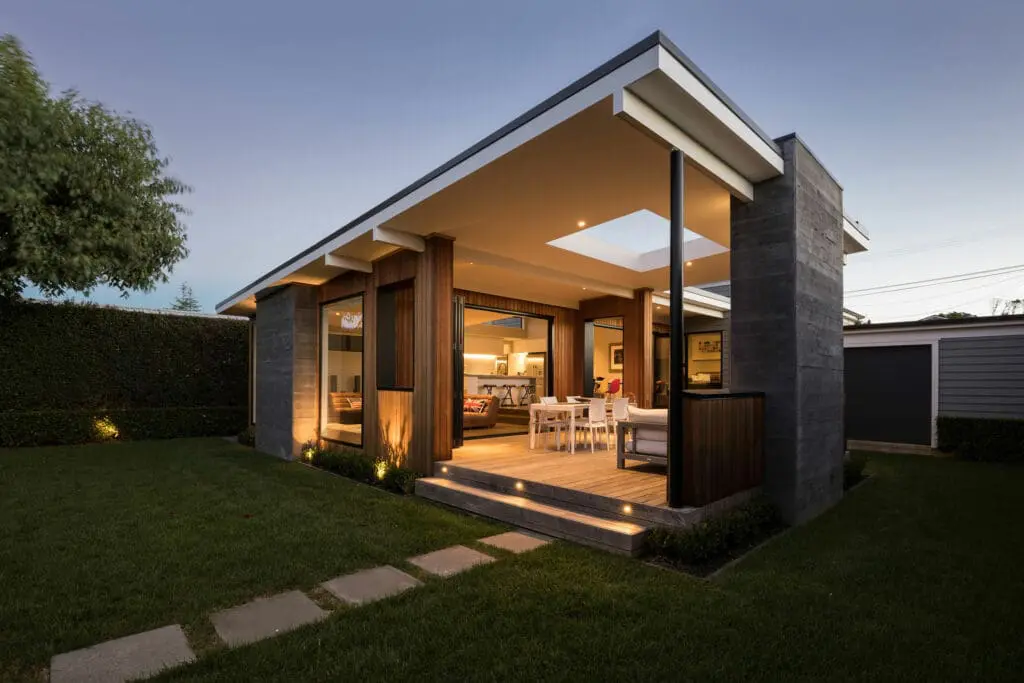Learn how the building process works.
We know how difficult it can be to understand the process of building, extending or renovating your home. We’ve put together a step-by-step guide below to answer some of the main questions we receive from homeowners, and make you feel more confident and comfortable with the journey towards making your dream home a reality.
Where should I start?
During the build
Once the build is complete
Where should I start?
Design stage
While we know that building can be costly, it’s important to have a home suitable for your family or lifestyle. We recommend reaching out to an architect or designer to draw up a plan or design for your new home or renovation. It can even be worth getting in touch with a few different architects or designers, to gain a better idea of the price range you’re looking at, and ensure the design is right for what you want in your home.
Our architecturally designed Studio Plans are ready to build immediately. Designed with you in mind, our range can be fully customised to suit. Whether space is at a premium, there’s a view to maximise, or you can afford to spread out, there’s a Studio Plan for you.
Looking for some inspiration? View our Revere Gallery.

Where should I start?
Choosing a builder
Choosing the right builder early on is one of the most important decisions you’ll need to make.
Whether you’re knocking down a few walls or building a home from scratch, it’s important to work with people you trust. Our builders pride themselves on excellence and professionalism, so you’ll be in safe hands from your first hello to move-in day. Before your project begins, ensure you have discussed the items on this checklist with your chosen builder.
The best way to choose your builder is to engage a selection of builders and gain as much information as possible. Ask them if they can provide customer references, what team will be working on your build, if they can get discounted products, some examples of their previous building work, and an estimate of pricing and how long it will take.
All of our builders must meet strict criteria to ensure their practical expertise is second to none. The minimum entry requirement for all members is a recognised industry trade qualification. Our builders have a history of stability and success and a solid reputation for realising homeowners aspirations.
Ready to start your search? Find an approved NZCB builder.

Where should I start?
Building Work Agreement
If financial assistance is required, seek advise before continuing.
Before signing a building contract, ensure the following:
- You understand the contract offering and terms & conditions of the contract (seek legal advice if necessary)
- There is a detailed scope of works, outlining the work that the builder will be undertaking
If a deposit is requested from your builder, payment is required on signing of the building contract.
Where should I start?
Building consent
To enable you to submit plans for council consent, discuss the following requirements with your builder:
- Obtain a certificate of works from the designer (if applicable) and ensure site specific specification accompanies the plans
- Obtain engineering producer statements and reports
- Obtain geotech producer statements and reports
- Obtain HAIL report (hazard activities & industry list) – if applicable
Where should I start?
Insurances & Guarantees
When you choose an approved NZCB builder, you’ll qualify to apply for a Halo 10-Year Residential Guarantee. This unique cover is a safety net for your building project that’s only available when you work with a highly qualified NZCB approved builder.
If a Halo 10-Year Residential Guarantee is part of the agreement, sign the application your NZCB builder has completed, and ask them for the Halo 10-Year Residential Guarantee Homeowner Handbook for full details of the guarantee coverage, exclusions and additional benefits. Ensure your application is submitted and approved by Halo Guarantees Limited prior to the Building Works commencing.
Contract Works Insurance provides cover for physical loss to the property during the build including materials and items specified in the contract. The policy provides cover for fire, storm, natural disaster and all accidental damage during construction.
The builder usually takes out the contract works on a new build, whilst the homeowner should be responsible for taking it out on a renovation or any work on an existing structure, as part of their house & contents insurance. Regardless of who holds the policy, it’s important that both the builder and the homeowner have a copy of the policy schedule/certificate prior to the work commencing.

During the build
Variations
A variation is a change in product, design, scope of work, price fluctuation, or anything that impacts the project. Variations have to be agreed to by yourself and your builder and captured in writing.
Your builder should provide you with a Notice of Variation to advise you of any new fixed or non-fixed costs, or credits due to you (as sometimes a variation may mean less work or materials are required). If a variation is required with no change to cost, your builder should still provide an advisory note.
It is also important to note the Halo Guarantee may extend to covering variations, provided that both the builder and the homeowner have agreed to the variation in writing.
During the build
Payment claims & invoices
On receipt of payment claims/invoices submitted by your builder, ensure you understand your obligations outlined under the Construction Contracts Act 2002.
Once the build is complete
Building contract completion
You and your builder must sign the building contract practical completion certificate. A mandatory 12 month defect repair period is placed on all residential work from the date the building work is complete. If you identify any defects, such as non-compliance with the Building Code, non-agreed variations, premature product failure, or anything that could be deemed as poor industry levels of quality or performance, you must advise your builder in writing within 12 months. Read the Guide to Tolerances for more information. On signing the practical completion certificate, the 12 month defect period commences.
If a Halo 10-Year Residential Guarantee is part of your agreement, you will need to sign a separate Halo practical completion certificate. This captures the final contract price. If this value has increased substantially through variations, there may be an additional premium. Once this form is submitted and accepted by Halo Guarantees, the 10 Year Defect Period commences.
Once the build is complete
Handover
If it’s a renovation, alteration or extension that has been completed, you are responsible for cancelling the Contract Works Insurance.
If it’s a new build that has been completed, ask your builder to provide product & service warranties and maintenance schedules. The Contract Works Insurance expires at the completion of the building contract, or when you move into the home. You should have your home and contents insurance set up at this point to ensure continuity of cover. Don’t forget to ask your builder for the keys to your new home.
Enjoy your slice of special, in a space perfectly tailored to your needs.




